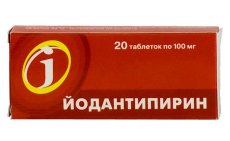Medical expert of the article
New publications
Preparations
Iodantipyrine
Last reviewed: 03.07.2025

All iLive content is medically reviewed or fact checked to ensure as much factual accuracy as possible.
We have strict sourcing guidelines and only link to reputable media sites, academic research institutions and, whenever possible, medically peer reviewed studies. Note that the numbers in parentheses ([1], [2], etc.) are clickable links to these studies.
If you feel that any of our content is inaccurate, out-of-date, or otherwise questionable, please select it and press Ctrl + Enter.

Iodantipyrine is a narrow-spectrum antiviral drug with anti-inflammatory properties.
Indications Iodantipyrine
Indications for the use of Iodantipyrine are:
- tick-borne encephalitis in adults;
- prevention of tick-borne encephalitis in the event of detection of an attached tick (before seeking medical attention) or the presence of such a threat in natural foci of tick-borne encephalitis;
- when an attached tick is detected in persons who have previously been vaccinated against tick-borne encephalitis;
- hemorrhagic nephrosis-nephritis (hemorrhagic fever with renal syndrome).
Pharmacodynamics
The pharmacodynamics of Iodantipyrine is based on the active substance of the drug, a pyrazolone compound - 1-phenyl-2,3-dimethyl-4-iodopyrazolone, which exhibits activity against neural tick-borne encephalitis viruses, as well as viruses carried by ixodid and gamasid ticks, causing hemorrhagic fever with nephrosyndrome.
When entering the bloodstream, Yodantipyrine activates alpha and beta interferon, thereby improving the coordination of biochemical processes in the body's lymphatic system, and significantly increasing immunity at the cellular level. Stabilization of cell membranes helps prevent the introduction of viral cells into them. Thus, the effect of this drug in relation to antigens can be considered immunomodulatory.
Pharmacokinetics
After taking the drug Yodantipyrine, it is absorbed from the gastrointestinal tract into the blood within a short time, 25% of the active substance binds to blood plasma proteins. After 10-12 hours, the maximum concentration of the drug in tissues is reached. The level of biological availability is at least 80%.
Transformation of about 95% of 1-phenyl-2,3-dimethyl-4-iodopyrazolone occurs in the liver, passive metabolites make up to 90%. Metabolites and the unsplit portion of the drug are excreted from the body through the kidneys with urine, their half-life is approximately 6 hours.
Dosing and administration
For the treatment and prevention of tick-borne encephalitis (in the case of an attached tick), the following regimen for taking Iodantipyrine is prescribed:
- the first two days - 3 tablets (0.3 g), three times a day;
- on the third and fourth days – 2 tablets (0.2 g), three times a day;
- for the next 5 days – one tablet, 3 times a day.
For the purpose of prevention during stays in natural foci of tick-borne encephalitis, the recommended dosage of the drug is 2 tablets once a day.
For the treatment of hemorrhagic fever with renal syndrome, Iodantipyrine is prescribed in the first five days from the onset of symptoms of the disease. The recommended standard dose is 2 tablets (0.2 g) three times a day (for 4 days), then another 5 days should be taken one tablet 3 times a day.
Use Iodantipyrine during pregnancy
This medicine is certified only in the Russian Federation, thorough clinical trials for its teratogenicity have not been conducted. Therefore, the use of Iodantipyrine during pregnancy, as well as during breastfeeding, is contraindicated.
Overdose
An overdose of this drug may manifest itself in an increase in its side effects, as well as symptoms of iodism. Among such symptoms are: inflammation of the mucous membranes of the upper respiratory tract in the form of laryngitis or tracheitis, runny nose, increased salivation, metallic taste in the mouth, lacrimation, conjunctivitis, increased body temperature, general weakness, intestinal disorders, papular rashes on the skin.
Interactions with other drugs
When taking Iodantipyrine simultaneously with heartburn medications and H2-receptor antagonists, the level of its absorption in the gastrointestinal tract decreases.
When interacting with hypoglycemic drugs for the treatment of diabetes, barbiturate sleeping pills, tricyclic antidepressants and anticoagulant drugs, Iodantipyrine can enhance their effect.
It is also not recommended to use Iodantipyrine together with anti-tick immunoglobulin.
Storage conditions
Storage conditions for Iodantipyrine: in a dark place at a temperature not exceeding +24-25°C.
Attention!
To simplify the perception of information, this instruction for use of the drug "Iodantipyrine" translated and presented in a special form on the basis of the official instructions for medical use of the drug. Before use read the annotation that came directly to medicines.
Description provided for informational purposes and is not a guide to self-healing. The need for this drug, the purpose of the treatment regimen, methods and dose of the drug is determined solely by the attending physician. Self-medication is dangerous for your health.


 [
[